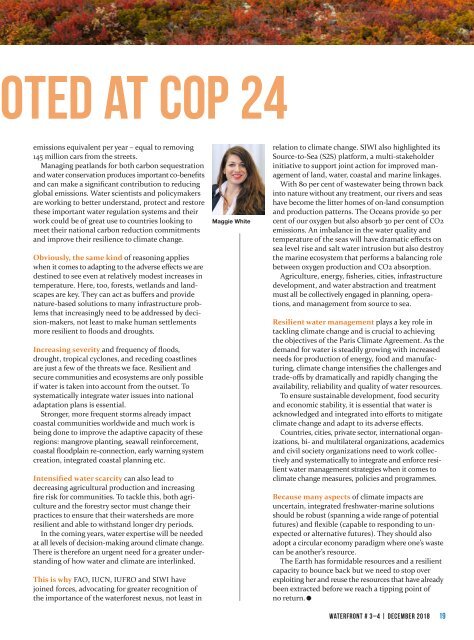Water Front #3-4 2018
Create successful ePaper yourself
Turn your PDF publications into a flip-book with our unique Google optimized e-Paper software.
TED AT COP 24<br />
emissions equivalent per year – equal to removing<br />
145 million cars from the streets.<br />
Managing peatlands for both carbon sequestration<br />
and water conservation produces important co-benefits<br />
and can make a significant contribution to reducing<br />
global emissions. <strong>Water</strong> scientists and policymakers<br />
are working to better understand, protect and restore<br />
these important water regulation systems and their<br />
work could be of great use to countries looking to<br />
meet their national carbon reduction commitments<br />
and improve their resilience to climate change.<br />
Obviously, the same kind of reasoning applies<br />
when it comes to adapting to the adverse effects we are<br />
destined to see even at relatively modest increases in<br />
temperature. Here, too, forests, wetlands and landscapes<br />
are key. They can act as buffers and provide<br />
nature-based solutions to many infrastructure problems<br />
that increasingly need to be addressed by decision-makers,<br />
not least to make human settlements<br />
more resilient to floods and droughts.<br />
Increasing severity and frequency of floods,<br />
drought, tropical cyclones, and receding coastlines<br />
are just a few of the threats we face. Resilient and<br />
secure communities and ecosystems are only possible<br />
if water is taken into account from the outset. To<br />
systematically integrate water issues into national<br />
adaptation plans is essential.<br />
Stronger, more frequent storms already impact<br />
coastal communities worldwide and much work is<br />
being done to improve the adaptive capacity of these<br />
regions: mangrove planting, seawall rein force ment,<br />
coastal floodplain re-connection, early warning system<br />
creation, integrated coastal planning etc.<br />
Intensified water scarcity can also lead to<br />
decreasing agricultural production and increasing<br />
fire risk for communities. To tackle this, both agriculture<br />
and the forestry sector must change their<br />
practices to ensure that their watersheds are more<br />
resilient and able to withstand longer dry periods.<br />
In the coming years, water expertise will be needed<br />
at all levels of decision-making around climate change.<br />
There is therefore an urgent need for a greater understanding<br />
of how water and climate are interlinked.<br />
This is why FAO, IUCN, IUFRO and SIWI have<br />
joined forces, advocating for greater recognition of<br />
the importance of the water forest nexus, not least in<br />
Maggie White<br />
relation to climate change. SIWI also highlighted its<br />
Source-to-Sea (S2S) platform, a multi-stakeholder<br />
initiative to support joint action for improved management<br />
of land, water, coastal and marine linkages.<br />
With 80 per cent of wastewater being thrown back<br />
into nature without any treatment, our rivers and seas<br />
have become the litter homes of on-land consumption<br />
and production patterns. The Oceans provide 50 per<br />
cent of our oxygen but also absorb 30 per cent of CO2<br />
emissions. An imbalance in the water quality and<br />
temperature of the seas will have dramatic effects on<br />
sea level rise and salt water intrusion but also destroy<br />
the marine ecosystem that performs a balancing role<br />
between oxygen production and CO2 absorption.<br />
Agriculture, energy, fisheries, cities, infra structure<br />
development, and water abstraction and treatment<br />
must all be collectively engaged in planning, operations,<br />
and management from source to sea.<br />
Resilient water management plays a key role in<br />
tackling climate change and is crucial to achieving<br />
the objectives of the Paris Climate Agreement. As the<br />
demand for water is steadily growing with increased<br />
needs for production of energy, food and manufacturing,<br />
climate change intensifies the challenges and<br />
trade-offs by dramatically and rapidly changing the<br />
availability, reliability and quality of water resources.<br />
To ensure sustainable development, food security<br />
and economic stability, it is essential that water is<br />
acknowledged and integrated into efforts to mitigate<br />
climate change and adapt to its adverse effects.<br />
Countries, cities, private sector, international organizations,<br />
bi- and multilateral organizations, academics<br />
and civil society organizations need to work collectively<br />
and systematically to integrate and enforce resilient<br />
water management strategies when it comes to<br />
climate change measures, policies and programmes.<br />
Because many aspects of climate impacts are<br />
uncertain, integrated freshwater-marine solutions<br />
should be robust (spanning a wide range of potential<br />
futures) and flexible (capable to responding to unexpected<br />
or alternative futures). They should also<br />
adopt a circular economy paradigm where one’s waste<br />
can be another’s resource.<br />
The Earth has formidable resources and a resilient<br />
capacity to bounce back but we need to stop over<br />
exploiting her and reuse the resources that have already<br />
been extracted before we reach a tipping point of<br />
no return.<br />
WATERFRONT # 3–4 | december <strong>2018</strong><br />
19


















